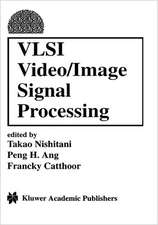Dynamic Memory Management for Embedded Systems
Autor David Atienza Alonso, Stylianos Mamagkakis, Christophe Poucet, Miguel Peón-Quirós, Alexandros Bartzas, Francky Catthoor, Dimitrios Soudrisen Limba Engleză Paperback – 23 aug 2016
| Toate formatele și edițiile | Preț | Express |
|---|---|---|
| Paperback (1) | 386.00 lei 6-8 săpt. | |
| Springer International Publishing – 23 aug 2016 | 386.00 lei 6-8 săpt. | |
| Hardback (1) | 393.35 lei 6-8 săpt. | |
| Springer International Publishing – 2 oct 2014 | 393.35 lei 6-8 săpt. |
Preț: 386.00 lei
Nou
Puncte Express: 579
Preț estimativ în valută:
73.87€ • 77.02$ • 61.39£
73.87€ • 77.02$ • 61.39£
Carte tipărită la comandă
Livrare economică 21 martie-04 aprilie
Preluare comenzi: 021 569.72.76
Specificații
ISBN-13: 9783319362205
ISBN-10: 3319362208
Pagini: 260
Ilustrații: XIII, 243 p. 86 illus., 53 illus. in color.
Dimensiuni: 155 x 235 x 14 mm
Greutate: 0.37 kg
Ediția:Softcover reprint of the original 1st ed. 2015
Editura: Springer International Publishing
Colecția Springer
Locul publicării:Cham, Switzerland
ISBN-10: 3319362208
Pagini: 260
Ilustrații: XIII, 243 p. 86 illus., 53 illus. in color.
Dimensiuni: 155 x 235 x 14 mm
Greutate: 0.37 kg
Ediția:Softcover reprint of the original 1st ed. 2015
Editura: Springer International Publishing
Colecția Springer
Locul publicării:Cham, Switzerland
Cuprins
Introduction.- Analysis and Characterization of Dynamic Multimedia Applications.- Profiling and Analysis of Dynamic Applications.- Dynamic Memory Management Optimization for Multimedia
Applications.- Systematic Placement of Dynamic Objects across Heterogeneous Memory Hierarchies.
Applications.- Systematic Placement of Dynamic Objects across Heterogeneous Memory Hierarchies.
Recenzii
“This book presents a DMM optimization approach based on dynamic memory exploration of multimedia and network applications. It explains fundamental memory problems requiring optimization and also provides the details of the proposed optimization framework. Therefore, the book is helpful both as a reference book for those who want to learn general memory optimization concepts and as a guide for those who want to apply a similar optimization technique on their systems.” (Isil Oz, Computing Reviews, May, 2015)
Textul de pe ultima copertă
This book provides a systematic and unified methodology, including basic principles and reusable processes, for dynamic memory management (DMM) in embedded systems. The authors describe in detail how to design and optimize the use of dynamic memory in modern, multimedia and network applications, targeting the latest generation of portable embedded systems, such as smartphones. Coverage includes a variety of design and optimization topics in electronic design automation of DMM, from high-level software optimization to microarchitecture-level hardware support. The authors describe the design of multi-layer dynamic data structures for the final memory hierarchy layers of the target portable embedded systems and how to create a low-fragmentation, cost-efficient, dynamic memory management subsystem out of configurable components for the particular memory allocation and de-allocation patterns for each type of application. The design methodology described in this book is based on propagating constraints among design decisions from multiple abstraction levels (both hardware and software) and customizing DMM according to application-specific data access and storage behaviors.
· Provides a systematic and reusable methodology for DMM to address concerns ranging from software design to hardware-based memory management and system optimization;
· Describes in detail which optimization is the best candidate in DMM for each type of portabl
e embedded system; · Includes extensive examples with code excerpts, demonstrating application to multiple application domains related to multimedia and networking;
· Uses real industrial case studies to demonstrate the presented methodology.
· Provides a systematic and reusable methodology for DMM to address concerns ranging from software design to hardware-based memory management and system optimization;
· Describes in detail which optimization is the best candidate in DMM for each type of portabl
e embedded system; · Includes extensive examples with code excerpts, demonstrating application to multiple application domains related to multimedia and networking;
· Uses real industrial case studies to demonstrate the presented methodology.
Caracteristici
Provides a systematic and reusable methodology for DMM to address concerns ranging from software design to hardware-based memory management and system optimization Describes in detail which optimization is the best candidate in DMM for each type of portable embedded system Includes extensive examples with code excerpts, demonstrating application to multiple application domains related to multimedia and networking Uses real industrial case studies to demonstrate the presented methodology Includes supplementary material: sn.pub/extras




























